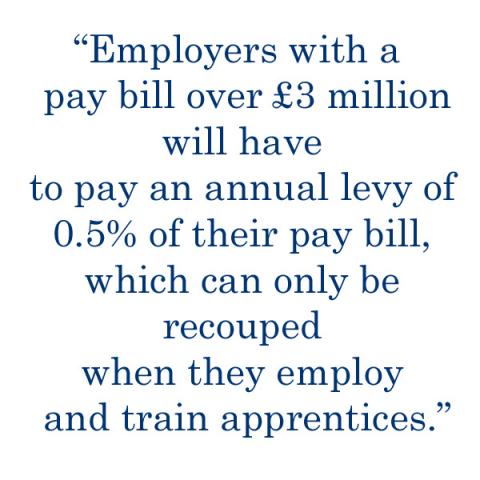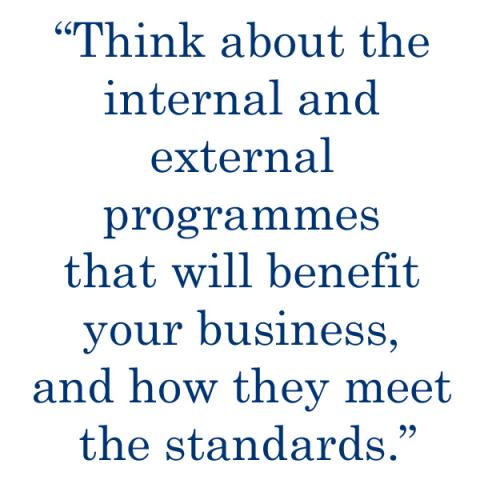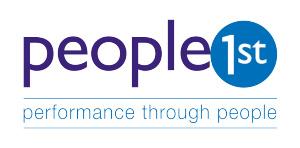With the apprenticeship levy due to start next April, People 1st share five things chefs and restaurants should know when taking on apprentices.
The apprenticeship system in England is currently going through its biggest change in decades.
 With new, business-led apprenticeship standards available for the hospitality, retail, aviation and travel industries - and the government’s apprenticeship levy due to kick in next April – there’s never been a better time to make apprenticeships part of your talent strategy.
With new, business-led apprenticeship standards available for the hospitality, retail, aviation and travel industries - and the government’s apprenticeship levy due to kick in next April – there’s never been a better time to make apprenticeships part of your talent strategy.
Apprenticeships are also a proven solution to tackling staff turnover – 80% of companies who invest in apprentices report an increase in staff retention.
Whether you’re already employing apprentices or are dipping your foot in the water for the first time – if you want your business to really benefit from the new system, here’s what you need to know...
- All businesses with a pay bill of over £3 million must pay an apprenticeship levy from April 2017.
The government is introducing an apprenticeship levy in April 2017, to encourage employers to commit to employing apprentices and growing their productivity. Employers with a pay bill over £3 million will have to pay an annual levy of 0.5% of their pay bill, which can only be recouped when they employ and train apprentices.
 TIP: If you want to make sure you get the best results from your levy payment, you need to start planning now. You should work out what impact it will have on your business and develop an apprenticeship strategy to ensure you maximise your return on the levy investment. For a summary on the apprenticeship levy, watch our short video.
TIP: If you want to make sure you get the best results from your levy payment, you need to start planning now. You should work out what impact it will have on your business and develop an apprenticeship strategy to ensure you maximise your return on the levy investment. For a summary on the apprenticeship levy, watch our short video.
- The new standards define the skills, knowledge and behaviours required for a given job role.
The new-style apprenticeships have been developed by employers and state exactly what an apprentice should be able to do once they complete their programme. This is very different from the existing apprenticeships, which specify a collection of qualifications an apprentice must take.
TIP: Look across your business to see which of the new standards, covering entry level through to managerial roles, can be used to develop your talent and increase productivity and retention.
- The training is not prescribed, so you can choose in-house or external programmes.
You have flexibility in the training your apprentice undertakes as long as it meets the apprenticeship standard - so you can decide the combination of training that best suits your business needs.
TIP: Think about the internal and external programmes that will benefit your business, and how they meet the standards. For support on implementing the new standards, join one of our upcoming webinars or seminars.
- You can use an external training provider or your in-house team to deliver the training.
 If you plan to use an external training provider, you’ll need
If you plan to use an external training provider, you’ll need


 With new, business-led apprenticeship standards available for the hospitality, retail, aviation and travel industries - and the government’s apprenticeship levy due to kick in next April – there’s never been a better time to make apprenticeships part of your talent strategy.
With new, business-led apprenticeship standards available for the hospitality, retail, aviation and travel industries - and the government’s apprenticeship levy due to kick in next April – there’s never been a better time to make apprenticeships part of your talent strategy.  TIP: If you want to make sure you get the best results from your levy payment, you need to start planning now. You should work out what impact it will have on your business and develop an apprenticeship strategy to ensure you maximise your return on the levy investment. For a summary on the apprenticeship levy,
TIP: If you want to make sure you get the best results from your levy payment, you need to start planning now. You should work out what impact it will have on your business and develop an apprenticeship strategy to ensure you maximise your return on the levy investment. For a summary on the apprenticeship levy,  If you plan to use an external training provider, you’ll need
If you plan to use an external training provider, you’ll need
 People 1st is the workforce development expert for the hospitality, tourism, travel, passenger transport and retail industries and works in partnership with employers to develop solutions that increase performance through people. For more information visit:
People 1st is the workforce development expert for the hospitality, tourism, travel, passenger transport and retail industries and works in partnership with employers to develop solutions that increase performance through people. For more information visit:









